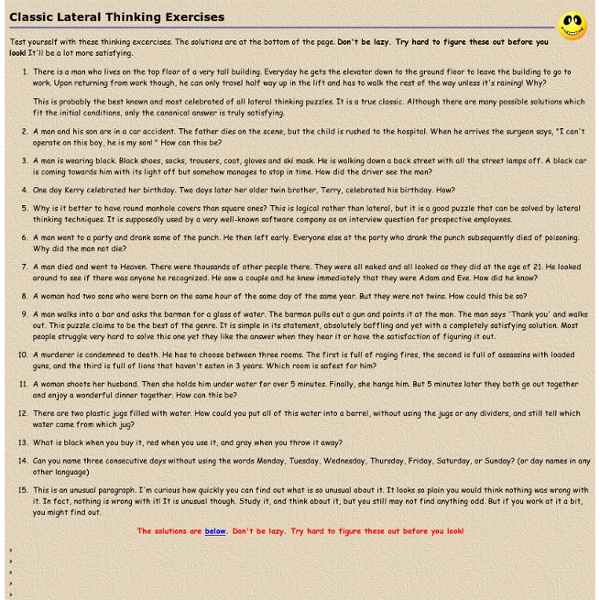Perception puzzles, Visual Perception, Optical illusions and Paradoxes
This page illustrates that our visual perception cannot always be trusted. The components of an object can distort the perception of the complete object. Our mind is the final arbiter of truth. Most optical illusions are the result of 1) incongruent design elements at opposite ends of parallel lines, 2) influence of background patterns on the overall design, 3) adjustment of our perception at the boundaries of areas of high contrast, 4) afterimages resulting from eye movements or from kinetic displays, or 5) inability to interpret the spatial structure of an object from the context provided by the picture. The Parthenon Optical illusions have been studied for millenia. Perpetually ascending staircase. The red squares are the same color in the upper part and in the lower part of the "X" The diagonal lines are parallel. There are no gray spots at the corners of the squares. Stairway between corners of a flat square. The rows of black and white squares are all parallel. Impossible triangle.
Free Video Lecture Courses Online at LearnersTV
Video Lectures, Video Courses, Science Animations, Lecture Notes, Online Test, Lecture Presentations. Absolutely FREE. Video Lecture Courses Science Animations Lecture notes Live Online Test Medical Online Test Free Magazines Free Magazines Subject Categories Powerpoint Presentations Medical Presentations Latest Statistics Wednesday, October 26, 2016 Video Lectures: 30741 Live Animations:410 Powerpoint Presentations:359 Home >>> Online Video Courses Free Online Video Lecture Courses on various subjects at LearnersTV.com Free Online Video Lecture Courses Watch out for more online video lecture course categories
Logical Paradoxes
Why Do Some People Learn Faster? | Wired Science
The physicist Niels Bohr once defined an expert as “a person who has made all the mistakes that can be made in a very narrow field.” Bohr’s quip summarizes one of the essential lessons of learning, which is that people learn how to get it right by getting it wrong again and again. Education isn’t magic. Education is the wisdom wrung from failure. A new study, forthcoming in Psychological Science, and led by Jason Moser at Michigan State University, expands on this important concept. The Moser experiment is premised on the fact that there are two distinct reactions to mistakes, both of which can be reliably detected using electroenchephalography, or EEG. The second signal, which is known as error positivity (Pe), arrives anywhere between 100-500 milliseconds after the mistake and is associated with awareness. The experiment began with a flanker task, a tedious assignment in which subjects are supposed to identify the middle letter of a five-letter series, such as “MMMMM” or “NNMNN.”
Home page | Some paradoxes - an anthology
9 Tactics for Rapid Learning (That Most People Have Never Heard Of)
Whenever the subject of why some people learn faster comes up, I get a whole host of common answers: Some people are just naturally smart. (Often implying you can’t improve)Everyone is “smart” in their own way. (Nonsense, research indicates different “intelligences” often correlate)IQ is all in the genes. (Except IQ changes with age and IQ tests can be studied for, like any other test) There may be some truth to these claims. Considering the upcoming launch of my rapid learning program, I wanted to share my favorite tactics to learn faster, retain information better or just enjoy the process of learning more: #1 – Pegging (or How Mental Magicians can Perfectly Recall Hundreds of Numbers) One of my favorite learning tactics, that is rarely mentioned, is pegging. The systems I’ve seen typically work with a special cheat sheet. From there, you can translate any series of numbers into a series of letters. Here’s a quick way to separate the rapid learners from the average learners.
Short but tricky management ability test
The following short quiz consists of 4 questions and tells whether you are qualified to be a “manager.” The questions are not that difficult. How do you put a giraffe into a refrigerator? The correct answer is: Open the refrigerator, put in the giraffe and close the door.This question tests whether you tend to do simple things in an overly complicated way.How do you put an elephant into a refrigerator? According to Andersen Consulting World wide, around 90% of the professionals they tested got all questions wrong.
Isms
Philosophical Isms Here are 234 different isms, each representing a philosophical, political or moral doctrine or a belief system. In selecting terms for the list, I have deliberately avoided any word which apply ism to a personal name, so that Marxism doesn't count although it is otherwise an ideal candidate for the list. I also excluded isms which do not refer to a specific belief system, such as impressionism (an artistic movement) or alcoholism (a disease). I hope you have found this site to be useful.



